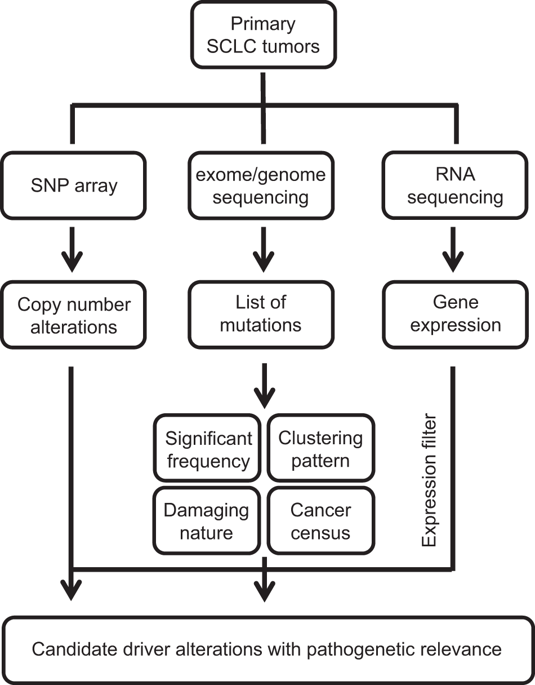当前位置:
X-MOL 学术
›
Exp. Mol. Med.
›
论文详情
Our official English website, www.x-mol.net, welcomes your feedback! (Note: you will need to create a separate account there.)
Recent progress in mapping the emerging landscape of the small-cell lung cancer genome.
Experimental & Molecular Medicine ( IF 9.5 ) Pub Date : 2019-12-12 , DOI: 10.1038/s12276-019-0349-5 Kee-Beom Kim 1 , Colin T Dunn 2 , Kwon-Sik Park 1
Experimental & Molecular Medicine ( IF 9.5 ) Pub Date : 2019-12-12 , DOI: 10.1038/s12276-019-0349-5 Kee-Beom Kim 1 , Colin T Dunn 2 , Kwon-Sik Park 1
Affiliation

|
Small-cell lung cancer (SCLC) remains the deadliest of all the lung cancer types. Its high mortality is largely attributed to the invariable development of resistance to standard chemo/radiotherapies, which have remained unchanged for the past 30 years, underscoring the need for new therapeutic approaches. The discovery of molecular targets for chemoprevention and treatment has been hampered by the poor understanding of SCLC progression. In recent years, comprehensive omics-based analyses have led to the discovery of recurrent alterations in patient tumors, and functional studies using genetically engineered mouse models and patient-derived tumor models have provided information about the alterations critical for SCLC pathogenesis. Defining the somatic alterations scattered throughout the SCLC genome will help to understand the underlying mechanism of this devastating disease and pave the way for the discovery of therapeutic vulnerabilities associated with the genomic alterations.
中文翻译:

绘制小细胞肺癌基因组新兴景观的最新进展。
小细胞肺癌 (SCLC) 仍然是所有肺癌类型中最致命的。其高死亡率很大程度上归因于对标准化学/放射疗法的耐药性的不断发展,过去 30 年这种耐药性一直保持不变,这强调了对新治疗方法的需求。由于对 SCLC 进展的了解不足,阻碍了化学预防和治疗的分子靶点的发现。近年来,基于组学的综合分析导致患者肿瘤反复发生改变的发现,使用基因工程小鼠模型和患者衍生肿瘤模型的功能研究提供了有关对 SCLC 发病机制至关重要的改变的信息。
更新日期:2019-12-13
中文翻译:

绘制小细胞肺癌基因组新兴景观的最新进展。
小细胞肺癌 (SCLC) 仍然是所有肺癌类型中最致命的。其高死亡率很大程度上归因于对标准化学/放射疗法的耐药性的不断发展,过去 30 年这种耐药性一直保持不变,这强调了对新治疗方法的需求。由于对 SCLC 进展的了解不足,阻碍了化学预防和治疗的分子靶点的发现。近年来,基于组学的综合分析导致患者肿瘤反复发生改变的发现,使用基因工程小鼠模型和患者衍生肿瘤模型的功能研究提供了有关对 SCLC 发病机制至关重要的改变的信息。















































 京公网安备 11010802027423号
京公网安备 11010802027423号